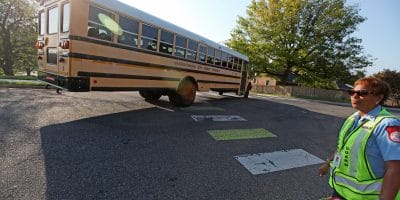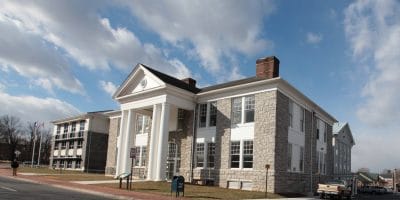By Liesl Graber with videos by Ian Munro
This post was updated at 10:18 to include the names of the community groups that organized the rally.
As a crowd gathered on the corner of High and Market Streets Monday evening, Jennifer Davis Sensenig, president of Faith in Action, urged the more than 80 people to march and make their case for local justice reform.
“We’re coming in force because we think the [CCJB] has the power to make local changes,” Sensenig said. The crowd responded with cheers.
Members of the Harrisonburg/Rockingham County community marched across town, waving signs representing the 27 congregations that are part of Faith in Action, to Memorial Hall for the 7 p.m. meeting of the Community Criminal Justice Board (CCJB).
The event was jointly led by Faith in Action, the Northeast Neighborhood Association and the Valley Justice Coalition.
As the crowd passed the local jail, inmates rapped on their windows. Rally-goers hooted and waved back. The line of participants stretched for two blocks, eventually joining with more community members to fill the Memorial Hall auditorium.
The CCJB organized Monday night’s meeting with community presence in mind, allowing for two minutes for business matters before devoting the rest of the time for guest speakers and questions from the audience.
Eliza Hoover, member of Quaker Valley Friends, said she has been looking for justice reform in Harrisonburg for years. Speaking from her experience as a former lawyer, Hoover said she believes cities that have hired community justice planner have saved those communities money.
“But it’s also true that we’re trying to save people,” she said.“That’s the most important part of things.”
That specific push for reform became a refrain.
“The system is hurting people,” said Meribeth Kraybill, member of Community Mennonite Church.“There are people who are decision makers in the system, and unless they know that the people of this community care, see and are becoming educated, they can do things without feeling accountable.”
Johonna Turner, from Bethel African Methodist Episcopal Church and professor of Eastern Mennonite University’s Center for Justice and Peacebuilding, said she hoped the meeting would be a step towards creating a community Christians envision, in which justice flourishes and alternatives to incarceration are sought first. That includes increasing access to education and mental health services, as well as a concerted effort to eliminate systemic racisim and focus on prevention of crime, she said.
“That’s not what this meeting is about,” she said, “but it’s a start.”
Strategies for reforms
The meeting featured two guest speakers: Kathy Rowings, justice program manager with the Washington D.C.-based National Association of Counties, and Neal Goodloe, a community justice planner based in Charlottesville.
Rowings presented strategies for improving Harrisonburg’s approach to incarceration by focusing on low-risk crime perpetrators in pretrial retention. People being held as they await trial make up 66 to 75 percent of a jail’s population. Most of them are accused of non-violent offenses, Rowings said.
“These people are legally presumed innocent,” Rowings said. Holding low-risk people in jail increases their chances to fail to return to court, to receive longer sentences, and to commit crime in the future, she said.
Rowings suggested taking low-risk perpetrators to a center designated to address behavioral problems and where those individuals can connect with social services.
Goodloe described his role as community justice planner as a “truth seeker” foremost. This person is an evidence-based, unbiased researcher who offers recommendations for change and follows through with an evaluation capacity, he said. They are guided by core questions, including: “Are the changes we implemented actually helping? And where are the data that show it?” he said.
Goodloe reported data from the central Virginia jurisdiction, noting crime is down 35 percent in the last ten years.
“But if crime is down, why is booking going up?” he asked. Low-risk inmates make up half of jail bookings. For every day a person spends in jail, he or she increases the likelihood of losing employment, access to a vehicle, a place to live, while gaining the wrong kind of connections in jail.
“Criminal risk is viral,” Goodloe said.
Call to end “keep fees”
Members of Faith in Action also called for a reduction or elimination of the $1 daily fee inmates are charged at the Rockingham-Harrisonburg Regional Jail. The charge is sometimes called a “keep fee” or “keepers fee.”
The cost usually falls to family members of the incarcerated, said Steven Thomas, who spoke during the open forum following the meeting.
Central Virginia, Goodloe said, does not have a keep fee, and funds the jail instead through taxes, telephone systems, and the commissary.
William Kyger Jr., a member of the Rockingham County Board of Supervisors, told the crowd that the goal of the meeting was to explore creating a community justice planner position.
“There’s probably a justifiable need for that [position],” he said. “But I can’t answer for everyone.”
What’s next?
Sensenig, Faith In Action’s president, said she was encouraged by the community’s interest.
“To have this fantastic turnout from the community gives me tremendous courage, and gives Faith in Action tremendous courage about continuing our work. It makes me very hopeful about being able to persuade local elected officials to do the right thing—to hire a planner, to eliminate the dollar a day,”she said.
The next CCJB meeting is on Dec. 3 at 4 p.m. in the Fire and Rescue Center.
Two council candidates also participated in the march—Sal Romero and Chris Jones:











